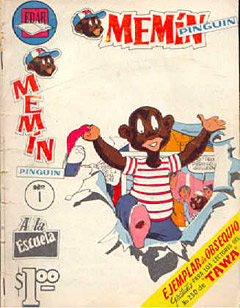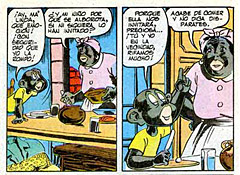 |
 |
 |
 News Around the Republic of Mexico | July 2005 News Around the Republic of Mexico | July 2005  
Controversial Mexican Comic Book Re-Issued, but Stamps won't Get a Second Run
 Mark Stevenson - Wire services Mark Stevenson - Wire services



| 


Artist Sixto Valencia Burgos was born in Tezontepel, Mexico in 1934. In 1953, he joined the atelier of Miguel Martin, where he started working for publisher Novaro Editorial. His comic 'Memin Pinguin', ran until 1977. |
Mexico City – A re-issue of the controversial "Memin Pinguin" comic book went on sale Thursday in Mexico, just a week after a postage stamp depicting the cartoon character with exaggerated black features stirred anger in the United States.

But the Mexican post office announced it will not re-issue the series of five stamps that the Mexican government hotly defended as part of the country's culture, and which many U.S. black activists called offensive.

Assistant Director Gustavo Islas of the Mexican Postal Service said that no further printing beyond the original 750,000-stamp issue was scheduled – in line with original plans.

He said that almost none of the service's other commemorative series "have received as good a reception as we have had with Memin."

The stamps sold out within a few days of their release. Many buyers were drawn by reports that Internet auction site eBay had bids of as much as US$200 (euro167) for a booklet.

The Memin Pinguin character is a hapless boy drawn with exaggerated features, thick lips and wide-open eyes. His speech and mannerisms are often the subject of kidding by white characters in the comic book.

Mexican officials defended the cartoon as an example of racial tolerance.

To capitalize on the cartoon's renewed popularity, publisher Grupo Editorial Vid decided to re-issue the whole series of 372 comics, starting with the first issue.

The comic began in the 1940s and hasn't had new story line for almost two decades. | 
 | |
 |



